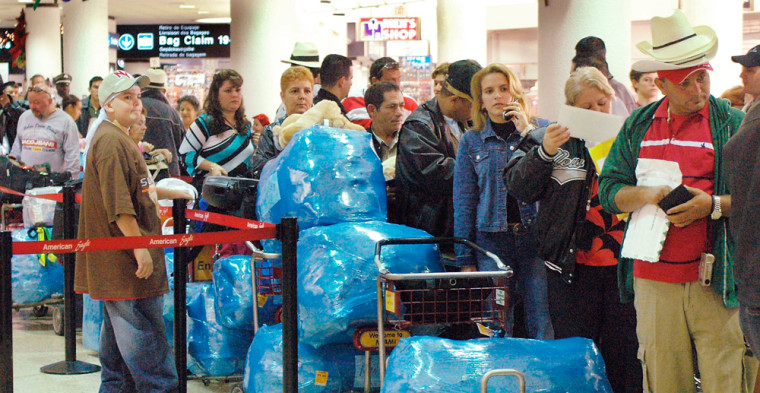A small but growing number of Cubans in South Florida are getting around the U.S. embargo that limits what can be sent to the communist island by sending their Christmas gifts through foreign Internet sites.
At least one Canadian Web site, http://www.cubamaxstore.com allows people to ship items such as beef, jams and even deodorant to relatives in Cuba. While the gifts aren't the I-Pods and Sony PlayStations that Americans crave, they are much appreciated by Cubans who earn an average of $10 to $15 a month and often struggle to put enough food on the table.
The trend exemplifies the creative ways Cuban families are seeking to stay connected, despite the restrictions on travel and exports imposed by the governments on both sides of the Florida Straits, said Cuban-American activist Ramon Saul Sanchez.
"Fortunately, people try to keep in touch with their families. Unfortunately, they have to go through all these measures," he said.
Antonio Conte, who left Cuba in the early 1990s and edits an online magazine of articles written by Cuban dissidents, recently ordered meat and other items to his adult daughter and son who live in Cuba. He said it was easier than going through one of the few authorized parcel services and safer than returning to the island.
"My uncle told me about it. It's better to send food there instead of money. It's not so expensive, and you can help a bit." Conte said. "In Cuba you have your ration card, and you get chicken only once in a while. Only the children and the sick get meat."
A gift basket of assorted canned meats and other snacks costs about $60. The Web site also offers electronics and appliances, although no one interviewed for this article said they purchased such items.
Fear for families
While the U.S. embargo against the island — enacted in 1963 at the height of the Cold War — has long limited what can be sent there, restrictions enacted in 2004 made sending gifts there even more difficult.
Now most Cubans in the U.S. can only visit the island once every three years and can only send quarterly remittances of up to $300 per household to immediate family members.
Add to that the Cuban government now takes 20 cents of every U.S. dollar sent there. The amount is smaller for other currencies, such as the euro or the Canadian dollar, which makes the Canadian online store more attractive.
Neither Cubamaxstore.com nor the U.S. Commerce Department, which enforces the embargo, returned numerous calls for comment.
Aleida Vives, 68, said she'd never used the Internet before she sent meat to her sister this year.
"It's a little cheaper," she said, adding that meat and other specialty items are often more expensive in Cuba and the quality is poor.
Others refused to talk about their purchases because they might be accused of supporting the island's communist government because they feared their families might get into trouble for accepting the gifts or sending them.
"I know people who do it, but I don't know too much about it," said Neuves Fernandez, who works at a Miami-area check cashing office that sends money orders to Cuba, echoing the response of many.
There's another concern. The Canadian Web site appears to operate in a legal gray area, said Florida International University Economics Professor and Cuba expert Jorge Salazar-Carrillo.
U.S. law forbids exporting products to Cuba through third countries such as Canada or Mexico, but it does make an exception for families sending food, vitamins and personal hygiene items of $200 or less to immediate family members, according to the U.S. Department of the Treasury's Office of Foreign Assets Control.
Cubamaxstore.com and its customers "are trying to operate under the radar of the U.S. regulations," Salazar-Carrillo said.
Conte said sending the food home is not about politics, it's simply about a father trying to help out his children.
"Food is the most difficult," he said. "My daughter never asks for anything, but they can eat and have a few days without that Cuban struggle of having to invent how they are going to get enough food on the table."
